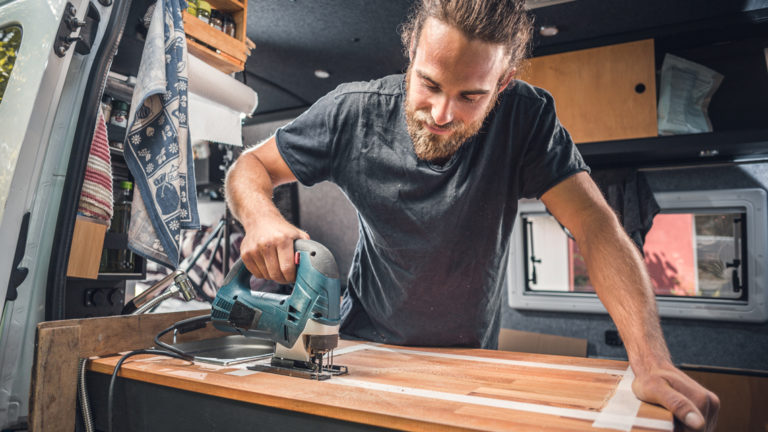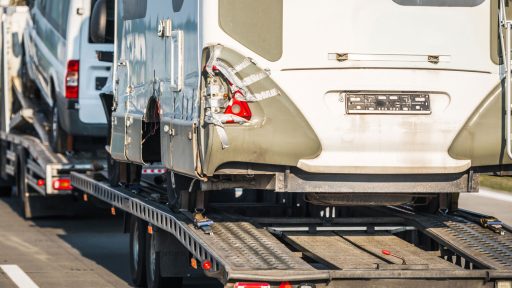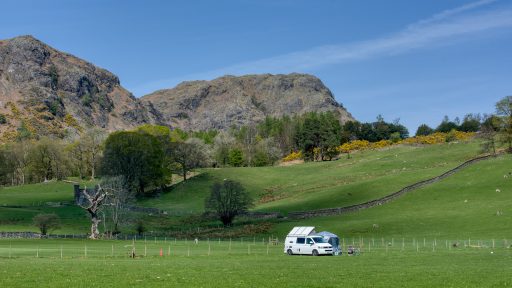Guide to registering a converted campervan or motorhome

If you’ve converted a panel van into a camper, reclassifying it with the DVLA can lead to several benefits. Here we take a look at what some of those benefits are, and what you need to do to reclassify your vehicle.
- Is there a difference between registering and reclassifying a vehicle?
- Do you have to register your van as a campervan conversion?
- What are the benefits of reclassifying a van as a campervan?
- What qualifies as a campervan conversion?
- How to register a van as a campervan.
- What insurance do you need for a campervan conversion?
Is there a difference between registering and reclassifying a vehicle?
When a vehicle is registered it’s usually because you’ve just bought or imported it, and this is normally completed by the company you purchase the vehicle from.
Reclassifying a vehicle simply means altering its description on your V5C (vehicle logbook) and you would need to do this if you have made changes to your vehicle.
Do you have to register your van as a campervan conversion?
You must update your V5C if you’ve altered your van to a campervan or a ‘motor caravan’ as it’s officially called, but you do not have to specifically apply for reclassification.
In some cases, the DVLA will also need to inspect the changes you’ve made in order to update your logbook.
The DVLA have strict guidelines that you’ll need to meet if you want to reclassify a van to a campervan. There’s no guarantee the changes will be officially approved but if your application is rejected you can still use your conversion as a campervan/motorhome.
Crucially, updating the vehicle body type description in the V5C does not affect the tax class of the vehicle. It’s there to simply allow enforcement agencies (like the police) to easily identify vehicles.
Read more: What’s the difference between a campervan and a motorhome?
What are the benefits of reclassifying a van as a campervan?
Reclassifying your converted van does have benefits:
- Cheaper insurance – premiums are generally lower compared to van insurance policies. This is because they’re classed as leisure vehicles and likely to cover fewer miles than the average work van. Don’t make this the main reason to reclassify though as not all insurers make this distinction.
- Increased cover for your possessions – a number of campervan policies will also cover your personal possessions up to a certain value which is usually higher than the limit for commercial vans.
- Higher speed limits – vehicles no more than 3.05 tonnes and classed as motor caravans can be driven at 70mph on dual carriageways and 60mph on a single carriageway. In comparison, vans (up to 7.5 tonnes) can only be driven at 60mph on a dual, and 50mph on single.
- Cheaper MOTs – MOT tests cost less as they’re considered class 4 vehicles (as are cars). Vans (between 3 – 3.5 tonnes) are class 7. Mind you, don’t get too excited as the difference is only £3.75.
What qualifies as a campervan conversion?
There are several conditions your conversion will need to meet before the DVLA will consider updating your V5C. Those conditions fall into three main categories:
The body type of the original vehicle
When registering a van as a motorhome, the vehicle you have converted must already be registered as a certain type of van. The list of eligible van body types is fairly extensive so this shouldn’t be too much of a barrier to getting your conversion approved. Examples include:
- Ambulances
- Box vans
- Insulated vans
- Livestock carriers
- Multi-purpose vehicles (MPVs)
Permanent external features
Vans that have been converted will need to have certain external features, such as:
- Two or more windows on at least one side of the vehicle. This does not include the driver or passenger windows. This is to ensure that your living space has enough natural light.
- A separate door that leads into the living area.
- An awning bar.
Internal features
In addition to specific external features, you’ll need to ensure that when registering a campervan conversion it includes suitable living accommodation. This includes:
- A seating area and a table.
- A sleeping area.
- Cooking facilities.
- Storage facilities.
These features should be fixed but they can be designed for flexibility. For example, the table can be removable, and the sleeping area can be converted from the seats.
A complete list of all the specifications that your conversion will need to meet can be found at GOV.UK.
How to register a van as a campervan.
You’ll need to apply to the DVLA to reclassify your van to a campervan and provide the following:
- A completed campervan checklist which details all the key features your conversion must have.
- Your V5C (logbook).
- Interior and exterior photos of the changes you’ve made.
- A photo of your van’s vehicle identification number (VIN).
All your evidence will need to be sent to the DVLA. They will then assess the details you’ve provided and make a decision about changing the description on your V5C.
There’s currently no charge for doing this but if your vehicle has to be inspected you’ll need to cover transport costs. For more detailed guidance, head to GOV.UK.
What insurance do you need for a campervan conversion?
Your insurance must reflect the type of vehicle you drive. If the DVLA change the description on the V5C you’ll need to let your insurer know as soon as possible. If you don’t your policy could be invalid as the official description change will mean your vehicle is no longer a van but a motor caravan instead.
If the DVLA reject your application to change the official description, you’ll still need to let your insurer know about the modifications you’ve made. Based on this information your provider may be happy to insure your vehicle as a campervan. However, that decision will be at your insurer’s discretion so it’s best to speak with them to find out what your options are.
Expert advice on campervan and motorhome insurance.
If you’ve spent time and effort on a van conversion you’ll want insurance that gives you peace of mind. At Alan Boswell Group, we offer campervan and motorhome insurance alongside a range of additional features to suit you.
For more information and to discuss policy options, speak to an expert member of the team on 01603 649650.
Thinking about hiring out your campervan, read our case study here.




